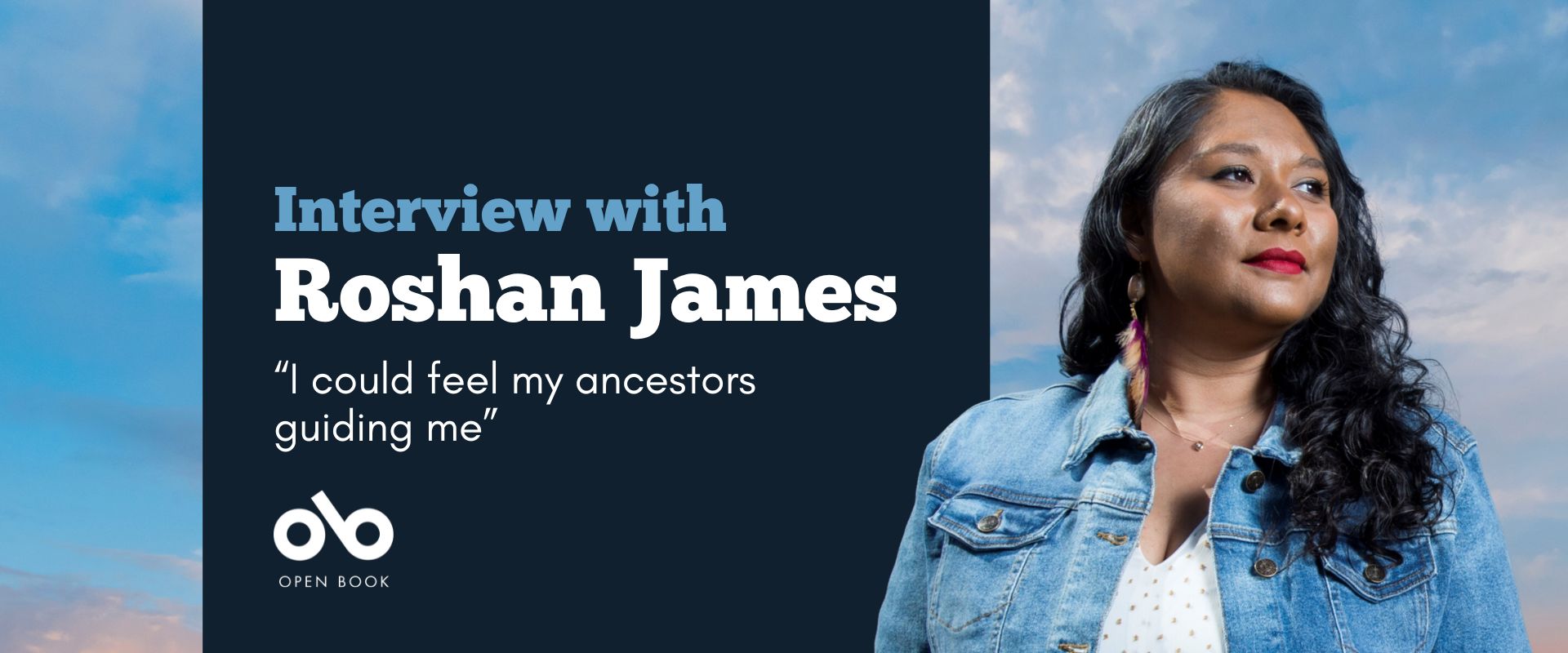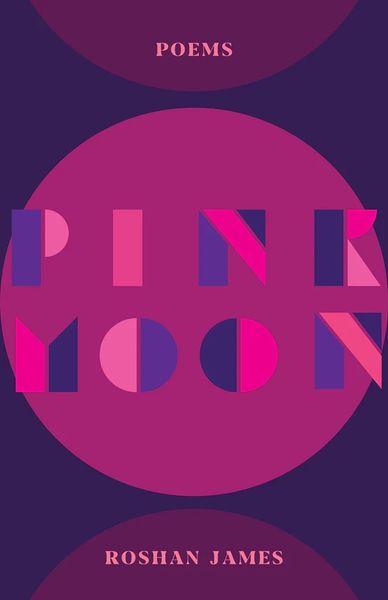Roshan James on Creating Poetry & Awareness About Canada's Deadliest Terrorist Attack
Just months ago, a CBC News report confirmed that nearly 90% of Canadians have little to no knowledge about the worst terror attack in our country's history, the 1985 Air India Bombing, in which a passenger plane out of Montreal exploded midair, killing all 329 people aboard, including 268 Canadian citizens.
This tragic event and the comparative silence around its remembrance became a point of origin for Roshan James' powerful debut poetry collection, Pink Moon (ECW Press). Timely and wise, Pink Moon explores decolonization, ancestry, and consciousness in a heady mix. James' personal connection to the attack, in which she lost a close family member, forms a spine to question oppression and silence through a lens of meticulous research, South Asian diasporic community, and an honouring of the divine feminine.
Deeply spiritual and connected, James' lyrical pieces utilize principles of mindfulness and meditation as well as her lived experience as a Tibetan-Indian born in Scarborough. Celebrating the magic of connection while mourning what is lost, James knits together wounds both personal and collective, finding healing beauty in a communal strength.
She tells us about the heartbreaking family loss that sparked the collection's first poem, about her work to "bring visibility to figures and stories that may have been traditionally excluded, othered, or demonized" in her art, and about how she protects and nurtures the "spirit-level process" of her early writing.
Open Book:
Tell us about this collection and how it came to be.
Roshan James:
The Pink Moon collection started spontaneously. I didn’t intend on writing a new collection at the time. I was toying with themes of questioning, nature, and our relationship to trees. I was also researching my family history, lineage, and ancestral connections. As part of my research, I was deeply interested in learning more about the circumstances around Air India Flight 182 which was bombed down in 1985. My aunt was a passenger on that plane, which really means she was a victim of the terrorist attack that took the plane down, leaving no survivors. I was five years old when the bombing happened, and for most of my life I remembered the event as a family tragedy, not realizing the national and international impact because this part of Canadian and world history is largely absent from school curriculum.
In parallel with my research on Air India Flight 182, I sat down one evening in March 2022 and started writing lines while visualizing the moment when my aunt was found in the ocean, off the coast of Cork Ireland, as part of the rescue operations following the bombing. The poem ‘Spirit of Her’ emerged, flowing out from the first line, “She rose up from the seabed...” With just a couple of minor edits, the poem remains almost unchanged from the moment I wrote it to how it appears in the published collection. ‘Spirit of Her,’ in honour of Sister Josephine Ann James, is the heart and soul of Pink Moon.
I don’t usually record myself reading poetry immediately after writing a piece, but I did with this one. I sent it to my life and vocal coach, Emm Gryner, without listening to the recording first. Emm was the first person to experience ‘Spirit of Her’ as spoken word, and her response to the poem encouraged me to share it with her partner, Michael Holmes, Executive Editor for ECW Press. Michael saw something in the poem, and we started working on a manuscript during the time of the Pink Moon of 2022. That time of creating was magical for me. I could feel my ancestors guiding me, speaking to me, and what has since ensued can only be described as divinely timed.
OB:
Was there any research involved in your writing process for these poems?
RJ:
I am a research fiend. Curiosity and learning are my everyday ways of being, so this collection is rooted in what I was researching in 2022, and what I continue to excavate about my Tibetan-Indian ancestry. As I mentioned before, I was starting to look into the Air India Flight 182 bombing when this collection came to be. I was also interested in my early Tibetan ancestors, and other species that were interacting with those early ancestors. The origins of the cosmos, space, time, geography, and nature are all realms of ongoing research for me. I enjoy peeling back layers of history through a divine feminine lens to unwind cultural knowledge from religious, patriarchal, colonizing forces. Through my visual and literary artwork, I bring visibility to figures and stories that may have been traditionally excluded, othered, or demonized to uphold a dominant, colonizer agenda. Connecting what I learn to aspects of my childhood and upbringing is a way for me to take what I learn through research, and use the information to inform my perspective and make sense of my lived experience, as a member of the South Asian diaspora.
Your CanLit News
Subscribe to Open Book’s newsletter to get local book events, literary content, writing tips, and more in your inbox
OB:
Apart from your editor and other publishing staff, who were the most instrumental people in the life cycle of this book? Did you share your writing with anyone while working on these poems?
RJ:
I am very private about my writing when I’m working on something fresh because, when I write poetry, I feel like I’m channeling messages and working in collaboration with chaos and a network of unseen guides. It’s a delicate, spirit-level process, and I generally share first drafts with a select few people who I feel safe with, such as my husband, Patrick, and my life coach, Emm.
When we were a couple of months away from publishing Pink Moon, I shared the manuscript with Aashay Dalvi, founder of Rad Riot Books, and Manahil Bandukwala, author of the incredible poetry collection Monument. Receiving feedback from two literary artists whose work and advocacy I admire was pivotal in understanding how Pink Moon would be received when released into the wild. Their reading and interpretations of the work helped me to see how Pink Moon is situated in contemporary diasporic literature.
OB:
Who did you dedicate the collection to and why?
RJ:
I dedicated this collection to my family. As cliché as that may sound, they are my home team. We are a large, blended family, with ancestry and lived experiences that span gender fluidity, decolonization, representation of the global majority, Indigeneity, and a deep love for nature. My family – my husband and kids – teach me about connection, community, compassion, and patience, and they have made the biggest impact on my life and my work.
OB:
For you, is form freedom or constraint in poetry?
RJ:
Form is a set of choices, and choice is freedom. Deciding how to structure a poem, where to break a line, whether to create a visual with the characters, words or lines... All of this is possibilities and potential. What feels constraining to me are imposed word limits, the projected limiting beliefs of others, and my own insecurities which sometimes feed indecision. That is when I feel most stuck. When I get clear of those moments, writing poetry is freedom.
OB:
What are you working on next?
RJ:
I am starting to put together an album of music, inspired by the poems in Pink Moon. The album will include original instrumental music mixed with beats and organic sounds, and may include layers of spoken word from the collection.
As a next phase of research and creation, I am working on a multimedia visual art exhibition proposal, bringing visibility and awareness to the Air India Flight 182 bombing to counteract erasure in education, and as a catalyst for personal and community healing.
____________________________________________________
Roshan James (she/her) is a poet and artist living as a settler in Newton, Ontario. Her work focuses on consciousness, anti-oppression, non-attachment, and healing. Roshan holds an Honours Bachelor of Arts degree in English Literature from York University, summa cum laude. You’ll find her on Instagram at @roshan_james.






